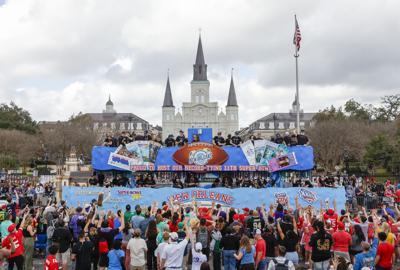
The Super Bowl LIX Host Committee Parade passes the St. Louis Cathedral in New Orleans, Saturday, Feb. 8, 2025. (Photo by Sophia Germer, The Times-Picayune)
STAFF PHOTO BY SOPHIA GERMER
The New Orleans Super Bowl host committee held a breakfast Wednesday morning to thank sponsors and staff members for a job well done. It was a chance for local officials to figuratively spike the football on a wildly successful Super Bowl LIX.
And deservedly so.
Super Bowl LIX was a home run for everyone involved, especially the local host committee, led by chairman Marcus Brown, and executives with the New Orleans Saints and Greater New Orleans Sports Foundation.
The collaboration among local, state and regional partners was inspiring, and the results were spectacular.
Super Bowl LIX had a $1.25 billion economic impact on the state, including $658 million in direct spending, according to a recent study by the LSU Center for Economics, Business and Policy Research. There were ancillary benefits, as well, such as extensive infrastructure improvements across the city.
The intangible benefits might have been even greater than the tangible ones. The Super Bowl arrived at a time when New Orleans desperately needed it. In the wake of the traumatic New Year’s Day terrorist attack and a seemingly endless string of bad news out of city hall, the Super Bowl delivered a much-needed boost to our civic pride and collective self-esteem.
Brown called it “one of the momentous achievements ever for our city and state. We broke records and set new standards for all future host cities.”
As with any event of such size and scale, not everything was perfect. The city will need to address some things before our next Super Bowl, among them a relative lack of corporate event space and high-end hotel rooms. Likewise, the influx of visitors, at times, overwhelmed the airport and its staff.
Otherwise, the reports from the NFL were exemplary.
“The best Super Bowl the NFL has ever had, according to (NFL commissioner) Roger Goodell,” is how Saints owner Gayle Benson described it.
Local officials wisely are trying to ride the momentum. No one wants to wait another 11 or 12 years, as we had to do for our last two Super Bowls. But, as always, the quest for another one is complicated.
First and foremost, the competition is more fierce than ever. Where Miami, Phoenix and Tampa were once seen as New Orleans’ main competitors for the big game, Las Vegas and Los Angeles have joined the mix. Both check all the Super Bowl boxes, with new stadiums, good weather, great nightlife and massive hotel inventories. Each will be regulars in future Super Bowl rotations.
Additionally, a growing list of cities with new or renovated stadiums will be under consideration. Nashville’s new $2.1 billion stadium and Jacksonville’s renovated “stadium of the future” are on track to open in 2028. New enclosed stadium projects are in the works in Chicago, Cleveland and Washington, D.C.
All eventually will jockey for their place in line, and — as we learned in 2018 and 2019 with Minneapolis and Atlanta — league owners and officials love to reward cities that build new stadiums with Super Bowls.
What's more, New Orleans’ bid for future Super Bowls is complicated by Mardi Gras and the busy calendar at the Ernest N. Morial Convention Center, which has booked major shows as far out as 2038.
It’s a Rubik’s Cube that requires countless hours of work and research from local officials in the sports, tourism and hospitality sectors.
The NFL has awarded the next three Super Bowls to San Francisco (2026), Los Angeles (2027) and Atlanta (2028), and will likely announce the 2029 game at the league’s fall meeting in New York in October.
New Orleans is not expected to be in the mix for Super Bowl 2029 because of a conflict with Mardi Gras, which falls two days later than the game that year. A similar conflict with Mardi Gras makes the 2032 Super Bowl a nonstarter.
That leaves 2030, 2031, 2033 and beyond. The longer the wait, the more competition New Orleans faces from rival cities as their new stadiums come online. Therein lies the sense of urgency.
Landing another Super Bowl would be huge for the city. Along with a potential College Football Playoff championship game in 2028, it would cement our status as a major sports event hub while allowing us to reclaim outright the mantle as America’s most popular Super Bowl city.
“I’ll say it again, it’s what we do,” said Jay Cicero, the CEO of the Greater New Orleans Sports Foundation. “And now we can say, we did it. And we can also say, I hope we can do it again.”
When New Orleans lands another Super Bowl remains to be seen. Hopefully, it’s sooner rather than later.